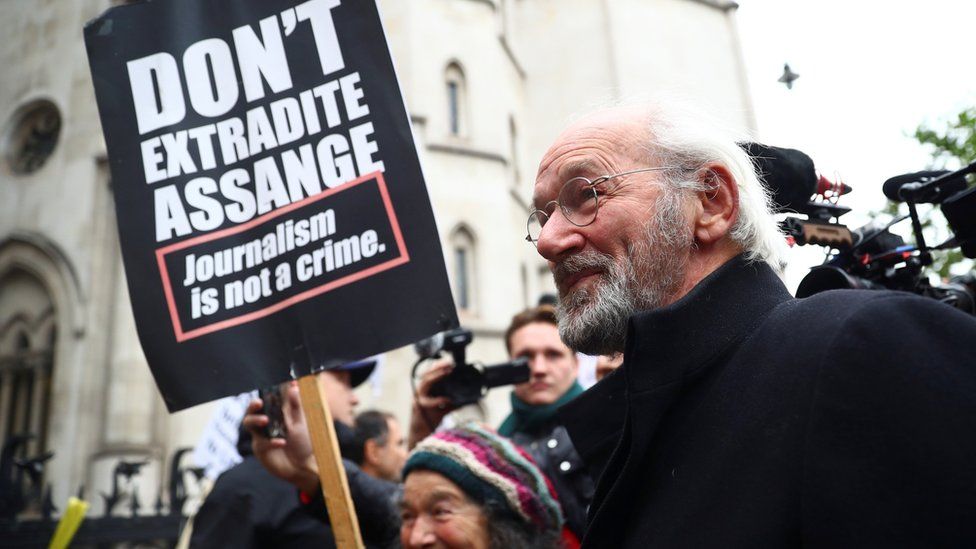Lawyers for the US say a judge who blocked Julian Assange’s extradition was misled by a psychiatrist.

Image source, Reuters
Lawyers for the US have told the High Court the judge who blocked Julian Assange’s extradition was misled by his psychiatrist.
The United States government is starting a legal appeal to try to get the Wikileaks founder extradited.
In January, a court ruled Mr Assange could not be extradited to the US due to concerns over his mental health.
Mr Assange is wanted over the publication of thousands of classified documents in 2010 and 2011.
The US says the leaks broke the law and endangered lives but Mr Assange says the case is politically motivated.
In the appeal against the January decision, barristers for the US said it had given four clear assurances that he would be treated humanely.
The district judge overseeing the USA’s extradition appeal at the start of the year, Vanessa Baraitser, said that while publishing on Wikileaks the classified military and government documents that Mr Assange released arguably amounted to a crime – including the disclosure of the identities of Iraqis and Afghan citizens who had helped coalition forces – he could not be transferred to the US because he was unwell and could take his own life.
However, the US team, launching its appeal, said the evidence was wrong and the Wikileaks founder could even serve a prison sentence back home in Australia.
James Lewis QC, representing the US, told the Lord Chief Justice and Lord Justice Holroyde the conclusion reached in January had been wrong on legal and evidential grounds.
Mr Lewis said Mr Assange’s psychiatrist had misled the earlier judge and the US had also not been given an opportunity to answer the judge’s concerns.
Mr Assange, 50, is wanted in the US on allegations of a conspiracy to obtain and disclose national defence information following WikiLeaks’ publication of hundreds of thousands of leaked documents relating to the Afghanistan and Iraq wars.
The publications include the release in April 2010 of footage showing US soldiers shooting dead civilians from a helicopter in Iraq.

Image source, Reuters
Mr Assange has been held in Belmarsh Prison since 2019 when he was carried out of the Ecuadorian embassy in London by police before being arrested for breaching his bail conditions.
He had entered the embassy in 2012 to avoid extradition to Sweden to face sex offence allegations, which he has always denied and were eventually dropped.
At the outset of Wednesday’s proceedings, Mr Assange’s legal team told judges their client had been asked not to attend the hearing by video link because he was apparently not well enough to do so.
Later in the morning, Mr Assange chose to attend. He could be seen sitting in a video link suite at the prison, wearing a light coloured shirt and dark tie, with shoulder length hair and a black face mask around his mouth.
Mr Lewis told the High Court that Washington had now given four binding assurances as to how the hacker and activist would be treated:
- The US would not impose a highly restrictive form of solitary confinement on Mr Assange before or after trial – although it could do so if he committed a further offence
- Mr Assange could apply to serve a sentence in Australia and the US would agree to that transfer
- Prison authorities would ensure Mr Assange would receive “any such clinical and psychological treatment” that prison clinicians recommended
- In addition to this, Mr Assange would also not be sent to ADX Florence, the United States’ “supermax” isolated prison, reserved for the worst offenders.
Mr Lewis said: “The assurances are clearing binding on the United States.”
He added: “The district judge’s approach carries with it the risk of rewarding fugitives for their flight, and of creating an anomaly between the approach of the courts in domestic criminal proceedings, and in extradition.”
Edward Fitzgerald QC, representing Mr Assange, told the court that although in written arguments the US authorities had “sought to minimise the severity of Mr Assange’s mental disorder and suicide risk”, it remained “perfectly reasonable to find it oppressive to extradite a mentally disordered person because his extradition is likely to result in his death”.
Mr Fitzgerald said that during the January court hearing, Ms Baraitser relied on the “inevitable fact” that – if extradited – Mr Assange would be detained in isolation and deprived of the protective factors he experienced in Belmarsh prison. The US’s assurances at the time did not remove the risk of detention in special administrative measures.
He added that although the US has said it could transfer Mr Assange to Australia if he was convicted, Australia has not said whether it would accept him, and the transfer “likely won’t occur”.
The High Court hearing is expected to end on Thursday and a decision will be made at a later date.
Supporters, family members and friends of Mr Assange have expressed their “outrage” after he was not allowed to attend his court hearing in person.
His partner, Stella Moris, was outside the Royal Courts of Justice in central London ahead of the hearing with other supporters of Mr Assange who had gathered.
Ms Moris said: “I’m very concerned for Julian’s health, I saw him on Saturday, he’s very thin.
“I hope the courts will end this nightmare, that Julian is able to come home soon and that wise heads prevail.
“We’re very concerned that he’s not able to be here today to give instruction to his lawyers, to be able to ask for clarifications about what’s going on in court.
“Julian should never be extradited.”